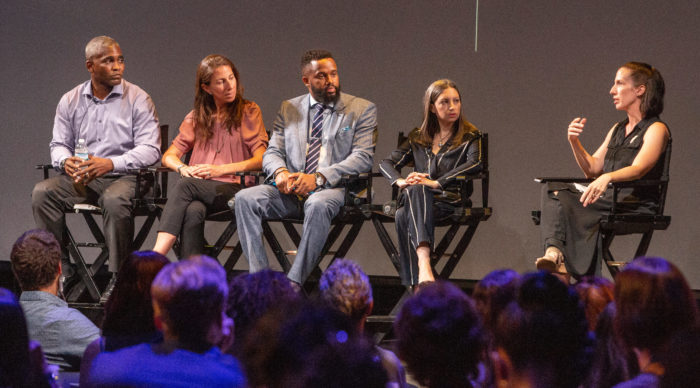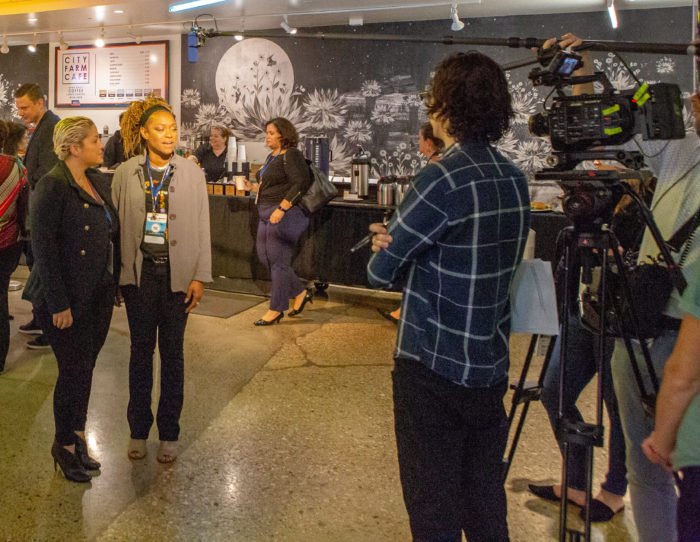In opening a panel discussion on corporate values at the From Day One conference, moderator Kathleen Davis wanted to start out fast, befitting the brand where she’s deputy digital editor, Fast Company. So she led off with a question straight from the headlines. Davis asked panelists how the Trump Administration, by inflaming so many social debates, has tested the values of corporate America.
“The values of a company start at the top,” Marissa Shorenstein, president of AT&T’s Northeast Region, responded. “We have a very large company with almost 300,000 employees, so it’s extremely important for the leadership of our company to set the tone and the moral code that we all follow.” The conference, in Downtown Brooklyn on Sept. 13, was co-produced by The Bridge.
Shorenstein called the current political atmosphere “unchartered times,” and observed that companies now “have to be careful about the messages they put out and which issues they weigh in on.” But she also brought up case where an unintentionally viral message from AT&T had a broadly positive impact.

Moderator Davis probed the panel: Do values emerge from the business mission, or the personal sentiments of top executives?
In the run-up to the 2016 Presidential election, AT&T’s CEO Randall Stephenson spoke emphatically about race relations in a speech to hundreds of employees. A person at the meeting uploaded a video of the speech to YouTube, where the clip has had more than 178,000 views. “Tolerance is for cowards,” Stephenson said in the speech, meaning that far greater action needs to be taken to close the social divide. Later he added: “If this is a dialogue that’s to begin at AT&T, I feel like it probably ought to start with me.”
Stephenson’s employees gave him a standing ovation. “I think it’s been very valuable to our employees to see our leader speak about [that issue],” Shorenstein said.
Offering a small-company perspective, James Hendon, director of the NYU Tandon Veterans Future Lab, an incubator for entrepreneurs who have served in the armed forces, talked about how values come into the discussion from the very beginning of a startup.
Hendon said the early-stage founders he works with are asking questions like “How do I set things up so that my organization … has values that dovetail with a lot of the different things being expressed in society?” They’re also pondering, “How do I make sure that people feel heard, and that their input informs the values of the company?”
Davis soon zeroed in on the difference between a company’s business values and broader social values. Do businesses talk about taking a stand only on issues directly related to their mission or their customers? Or do they look to take a moral high ground, sometimes driven by the personal values of top executives?

A video team at the From Day One conference, which drew 300 participants to BRIC House, recorded interviews with them about their own attitudes about business and society
“Yes, the executive suite, top down, sets an example, but really everything has to come from the bottom up,” said Susan Daimler, a VP and general manager at Zillow and StreetEasy, the merged digital real-estate marketplaces. “A gender issue might not be a [concern] for the leaders of Company X, but it is impactful to a lot of the employees.” Daimler added that “staying true to your employee base” is vital, and that companies must make sure their workers “have avenues to be heard” to cultivate “true company DNA.”
However, Daimler emphasized the balance between maintaining company values and sustaining the bottom line. “You also have a customer base to think about,” she noted. “You need to weigh carefully what your values are and [what] you’re projecting onto them.” Daimler suggested that sticking to “values that a lot of people can actually get behind, that aren’t politicized … can be meaningful for everybody.”
Later, Daimler explained that Zillow and StreetEasy put an emphasis on transparency, both within the company ranks and in customer relations. The company encourages workers to express their core values openly in the workplace, even rewarding them for doing so in performance reviews. Externally, the company promises consumers clarity on how they utilize user data.
Zillow and StreetEasy call this initiative “Turn On the Lights,” which provided a handy segue into a discussion about transparency at Con Edison, the energy utility, represented on the panel by Shaun Hoyte, who manages a program to help small and medium-size businesses reduce their energy consumption. (While Zillow and StreetEasy were “turning on the lights,” Con Edison was “turning off the lights,” Shorenstein quipped.)
By reducing energy consumption, Con Edison may appear to be “working directly against the company’s own self-interests,” Davis noted. But Hoyte said the counterintuitive approach benefits everyone by making the utility more reliable, decreasing its carbon footprint, and stimulating local economic growth. Daimler applauded the company’s approach, saying it was an example of an “evolution of values and culture,” which companies need to pursue through changing times.
Hoyte went on to discuss Con Edison’s push for transparency, both for customers and employees. “One thing that stood out about the company when I started back in 2007, they were very clear about the mistakes that they made in the past,” Hoyte said. During his initial training, he was required to watch 40 hours of video, much of which covered missteps at the utility that compromised the well-being of employees and customers.
“One of the six core principles of Con Edison is to seek and accept responsibility,” Hoyte went on, observing that many Con Edison employees can see the company from two sides. “We are our own customers,” he said of the employees, most of whom live in the area the utility services. “We need to protect all of our values.”